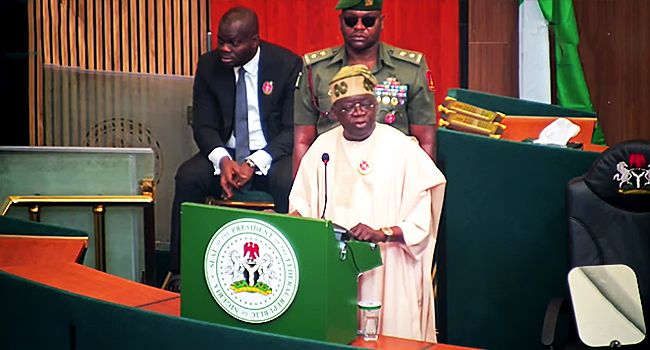
With total borrowing projected to hit N23trn, experts caution that rising fiscal indiscipline threatens private sector growth, investor confidence, and debt sustainability.
The Federal Government (FG) has borrowed N17.36 trillion from domestic and external sources between January and October 2025, overshooting its 10-month borrowing target by 55.6 percent, according to data from the Debt Management Office (DMO) and the Central Bank of Nigeria (CBN).
The figure exceeds the N10.9 trillion prorated borrowing limit set in the 2025 Appropriation Act, which approved N13.08 trillion in borrowing for the entire fiscal year.
Breakdown of the figures shows that N15.8 trillion was raised domestically as of October 2025, while N1.56 trillion came from external sources as of mid-year.
Last week, the FG also initiated moves to raise an additional $2.35 billion (about N3.38 trillion) through a Eurobond issuance, which could push total borrowing to N20.74 trillion.
If the current trend continues under the government’s monthly borrowing pattern, analysts estimate that total borrowing for 2025 could reach N23 trillion, roughly N10 trillion (80%) above the legal benchmark.
Budget Gap and Fiscal Pressure
Under the 2025 Appropriation Act, the Federal Government projected N54.99 trillion in total expenditure against N41.91 trillion in revenue, a N13.08 trillion deficit to be financed through both domestic and foreign borrowing.
By the approved framework, the government was expected to borrow around N1.09 trillion monthly, translating to N10.9 trillion by the end of October.
However, borrowing through various instruments has significantly surpassed expectations.
Data show that the FG raised N11.43 trillion through Treasury Bills alone in the first 10 months of 2025, a 4.6 percent year-on-year (YoY) increase from N10.93 trillion in the same period of 2024.
FGN Bond issuance fell 22 percent YoY to N4.04 trillion, while FGN Savings Bond subscriptions rose 5.6 percent YoY to N40.19 billion. In addition, N300 billion was raised through Sukuk Bonds, compared to zero issuance in 2024.
Experts Decry Fiscal Indiscipline, Rising Debt Risks
Financial experts say the borrowing surge reflects weak revenue performance and persistent fiscal indiscipline, warning that Nigeria risks falling into a self-reinforcing debt trap.
Andrew Uviase, Managing Partner at Ecovis OUC, described the situation as “a clear reflection of poor expenditure control.”
“The government still needs to do more in reducing the cost of governance. Without transparency and discipline, excessive borrowing will continue because spending remains unchecked,” he said.
He added that despite improvements in tax collection by the Federal Inland Revenue Service (FIRS), non-oil revenue remains underwhelming, with insecurity still hindering agriculture and other productive sectors.
David Adonri, Vice Executive Chairman of Highcap Securities, blamed the borrowing spike on “aggressive and unrealistic revenue assumptions,” particularly the oil benchmarks in the 2025 budget.
“The budget was based on an oil output of 2.06 million barrels per day and a $75 per barrel price — both unrealistic. Actual production has averaged around 1.6–1.7 million barrels, while prices have dropped to about $65,” he said.
He accused the government of being “addicted to debt,” arguing that “despite subsidy removals and claims of higher revenue, public spending keeps expanding.”
Tunde Abidoye, Head of Research at FBNQuest Merchant Bank, echoed similar concerns, describing the oil benchmarks as “overly optimistic,” leading to inevitable revenue shortfalls and higher borrowing.
Crowding Out Private Sector Credit
Analysts also warned that the government’s heavy reliance on domestic borrowing is crowding out the private sector, raising borrowing costs, and stifling productive investment.
Adonri noted that “excessive government demand for credit distorts market pricing.”
“Lenders prefer risk-free government securities to private ventures, making it difficult for manufacturers and SMEs to access affordable credit,” he said.
Uviase added that as banks shift their portfolios toward high-yield sovereign instruments, interest rates remain elevated, discouraging business expansion.
Clifford Egbomeade, a public finance analyst, warned that Nigeria may be entering a cycle where “new borrowing only serves to repay existing debts,” a scenario that could erode investor confidence and fuel inflation.
He noted that between January and August 2025, the CBN raised N26.4 trillion through Treasury Bills and OMO operations, a 57 percent year-on-year increase, signalling the government’s rising liquidity pressures.
“With OMO yields above 20 percent and the Monetary Policy Rate at 27.5 percent, debt servicing costs are rising faster than revenues. This approach offers short-term fiscal relief but worsens long-term vulnerabilities,” he said.
IMF, World Bank Raise Red Flags
Economists warned that the borrowing overshoot directly violates Nigeria’s Medium-Term Fiscal Framework (2025–2027) and undermines IMF-backed fiscal consolidation targets, which aim to cut the deficit below 3 percent of GDP.
Adonri said the trend shows that the government is only “paying lip service” to fiscal discipline.
“As long as this borrowing pattern continues, the warnings from the IMF and World Bank about Nigeria’s unsustainable debt-service-to-revenue ratio which hit 83 percent in 2024 will remain valid,” he said.
Egbomeade added that even with positive indicators like 4.23 percent GDP growth, 18 percent inflation, and $43 billion in reserves, fiscal credibility is eroding.
“Overshooting borrowing by 45 percent undermines the consolidation plan. While macroeconomic figures look better, the cost of governance now nearly N55 trillion remains a major drag,” he said.
Path Forward: Fiscal Discipline and Revenue Reforms
Experts urged the government to cut wasteful spending, improve non-oil revenue mobilisation, and rebalance borrowing toward longer-tenor concessional loans.
Uviase and Adonri called for reduced government intervention in sectors that can be managed by the private sector.
“Ending perennial deficit budgeting will strengthen the balance sheet. Government should allow the private sector to drive productivity,” Adonri said.
Abidoye noted that while ongoing tax reforms could raise revenue, “excessive taxation risks stifling growth.”
He added that the government should benchmark borrowing against revenue, not GDP, since “a 60 percent debt-to-revenue ratio is already a red flag.”
Egbomeade further advised the Debt Management Office (DMO) to strengthen its borrowing strategy, saying:
“Nigeria must fast-track digital tax collection, broaden VAT coverage, and cut recurrent costs. Borrowing should shift toward concessional, long-term loans that reduce refinancing pressure.”


